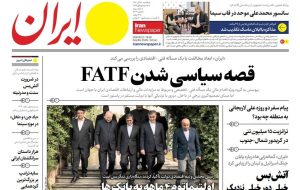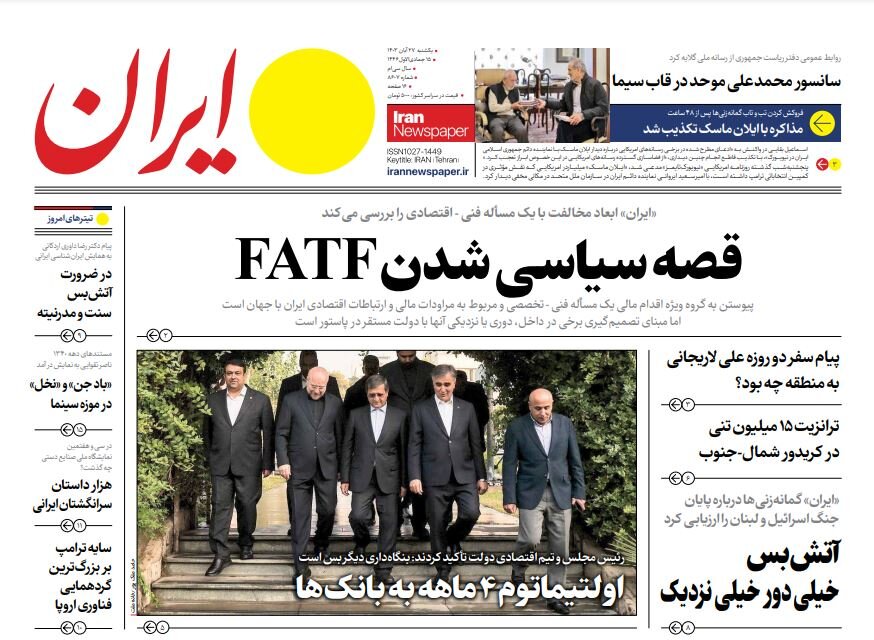Special diplomatic moves in 100 fateful days
TEHRAN – In a note, the Iran newspaper discussed the 100 days of the arduous path of the Pezeshkian government and quoted former diplomat Abbas Mousavi as saying: The terrorist operation that took place at the beginning of the government of Mr. Pezeshkian by the Zionist regime created a situation that affected the foreign policy


TEHRAN – In a note, the Iran newspaper discussed the 100 days of the arduous path of the Pezeshkian government and quoted former diplomat Abbas Mousavi as saying: The terrorist operation that took place at the beginning of the government of Mr. Pezeshkian by the Zionist regime created a situation that affected the foreign policy and led to immediate actions by the government.
Following the Al-Aqsa Storm Operation, Iran was directly involved in military tensions and this issue became the most important regional strategic issue of the 14th government. Iran’s diplomacy is aimed at neutralizing Tel Aviv’s goals of extending the war to Iran and leading it to make miscalculations. Therefore, the government was forced to change its direction and spend most of its potential on foreign policy to contain the tension the enemies had plotted against Iran. In such a situation, the 14th government has used all its diplomatic and political tools to overcome crises, and the current situation indicates this government’s success in reducing tensions and directing it toward a diplomatic path.
Etemad: Riyadh meeting and Arab calculations!
In an analysis, Etemad addressed the condemnation of Israel’s war crimes in Gaza and Lebanon by Saudi de facto leader Mohammed Bin Salman his demand that the occupation regime respect the sovereignty of the Islamic Republic of Iran. It wrote: The Arabs know that with the increasing possibility of a conflict between Iran and Israel, it is better to get closer to Iran and avoid the detriment of Iran’s aggressive actions and responses against any military action. Such diplomatic movements by Saudi Arabia as the leader of the Arab countries, which started before the escalation of the confrontation between Iran and Israel, should not go unnoticed. Such a policy by the Sudi Kingdom is worthy of attention even though it is tailored for public opinion due to the complex and dangerous conditions in the region and the reelection of Trump as president. This is a message to Trump that Saudi Arabia and other U.S. allies in the region are not ready to enter into competition and hostility with Iran again due to his policies, especially his 100% support for Israel. The Arabs want to focus on economic development.
Shargh: Attempts by reformers to divert the path of diplomacy
In a commentary, Shargh dealt with the claim of Elon Musk’s meeting with Amir Saeed Iravani, Iran’s permanent representative to the United Nations. The paper said: A look at Trump’s cabinet picks shows that these persons are anti-Iranian and Zionist. The media outlets that claim support for reforms viewed the meeting as an opportunity. This shows the pro-West figures are trying to divert the path of diplomacy towards the era of “hope and trust” in America and prevent Iran from achieving its rights. After the unbalanced and unguaranteed (nuclear) agreement that also lacks any mechanism for complaint was signed, the self-proclaimed reformists have adopted an approach against national interests by promoting the idea of “agreement at any price”. They have always blamed Iran instead of criticizing the U.S. and Europe for violating the JCPOA agreement. This is while the JCPOA was violated in the first days of its implementation during the Obama era and the agreement was turned into a useless paper. Iran powerfully shapes regional equations, and foreign circles believe that the Middle East is no longer in the hands of the White House. Yet, the pro-West aspirants are dreaming of repeating the begging diplomacy and this is detrimental to Iran.
Kayhan: Trump 2024 is the same as Trump 2016
Keyhan wrote what is of great importance in Trump’s general strategy of Trump and all past American administrations is the “existential threat” of the Islamic Republic of Iran. All American officials, whether Republicans or Democrats, believe that to stop Iran’s strategic programs such as nuclear and missile programs, and countering its regional clout, they must weaken the Islamic Republic’s ruling system. Therefore, successive American governments believe that if we can mobilize the people against the government, we will be able to get concessions from the government. Some statements by reformers and the daily headlines of their media in the direction of negotiations with the new American government show that Trump 2024 is different from Trump 2016. From this point of view, Trump’s return to the White House and these wrong statements should be considered in line with inducing bipolarity and division within the government and creating a psychological atmosphere in the country at a time when the enemy has suffered two successful and great operations of the True Promise I and II and has tasted their bitter taste.
